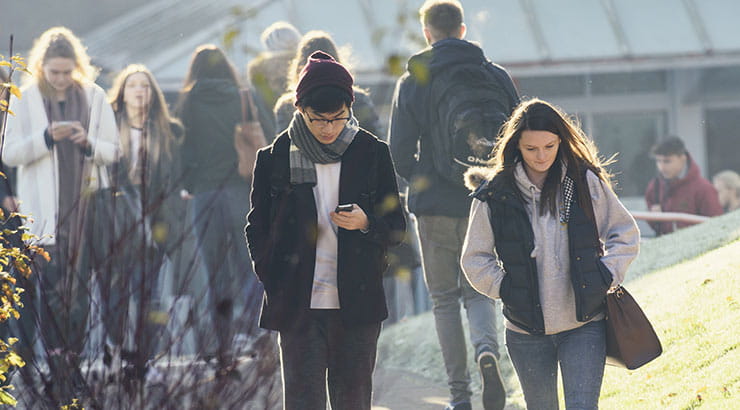How to be an ally to LGBTQ+ students
Support following Supreme Court ruling
We recognise that the recent UK Supreme Court ruling on the legal definition of a woman, may be distressing for some of our students, and we want to reassure you that support is available.
Whilst we consider the impact of this decision, we remain committed to being a welcoming, inclusive and supportive place to learn. Every member of our community deserves to feel safe and treated with respect, and any unacceptable behaviour will not be tolerated.
We’ve created a new trans and non-binary support and information page to help you find resources, guidance and safe spaces, especially if you're feeling overwhelmed or unsure right now. You deserve to feel safe, supported and heard.
If you’re struggling or just need someone to talk to, please don’t hesitate to reach out. We’re here for you.
LGBTQ+ community
Being an ally to those in the LGBTQ+ community is a great way to make your peers feel supported and safe during their time at university. People in marginalised groups often experience forms of discrimination. Offering help, empathy and a listening ear is an important way of being inclusive and letting others know they are not alone.
Tips on supporting someone who is LGBTQ+
The charity Mind has pulled together these helpful tips.
Find out moreThink about your language
A great first step in becoming an LGBTQ+ ally is looking at the language you use. There are plenty of small changes you could make that could mean a lot to others.
When introducing yourself, mention your preferred pronouns and invite others to do the same. If you're ever unsure of what language to use, don’t be afraid to ask. It’s better than making assumptions! Don’t ask individuals intrusive or personal questions. It’s ok to be curious, but some individuals will want to share on their own terms.
What you can do
You can show you are an ally to the LGBTQ+ community by the things you do. For example, step back and actively listen to the individual and their experiences. It is important to centre their voice and hear about how best you can support them. By allowing someone to be heard, you are creating a safe space for them.
You can also make it clear to others that you will not tolerate bulling, discrimination or slurs. If this does happen, stand up for others and report discriminatory behaviour to the university using our report and support tool.
Student blog
Brodie Goodall explores the importance of allyship within the LGBTQ+ community and shares practical ways to support and uplift those around us. Check out 'Allyship in Our Community' on our student blog.
Read moreLet's learn about it
The internet gives you the means to find out more about other’s experiences in an instant. A simple google is a great way to educate yourself about the LGBTQ+ community, their experiences, their challenges and what life is like for them. You can also follow LGBTQ+ advocates on social media or seek out resources or information online. For example, Stonewall have some great resources and a list of LGBTQ+ terms if you need a refresher.
You can also get clued up on microaggressions and learn how to call them out.
Another important tip is recognising intersectionality. Individuals may have various identities that overlap, meaning that they can experience discrimination in a variety of ways, for example race, religion, disability. An awareness of this is useful step in being an LGBTQ+ ally.
Further support
Check out these support links for more help and information if you are LGBTQ+.
Bristol Hate Crime Services (BHCS)
S.A.R.I. (Stand Against Racism and Inequality) with Brandon Trust, Bristol Mind and Lesbian Gay Bisexual and Transgender (LGBT) Bristol deliver hate crime and incident support services for Bristol.
NHS mental health support if you're LGBT+
Specific NHS mental health support and links to other organisations.
Switchboard
A national LGBTQIA+ support line for those looking to discuss anything related to sexuality and gender identity.
Trans+ and non-binary MindLine
A confidential emotional, mental health support helpline and signposting service for people who identify as Trans, A Gender, Gender Fluid, Non-binary.
You may also be interested in

Bristol Allies
Creating allyship in our community. We want to make sure that every student feels like they belong at UWE Bristol.

Report and Support
Our Report and Support online tool will help you speak up when you see or hear something that's not right.

Speak Up
We want to create an inclusive campus where antisocial attitudes and behaviours are challenged. If a situation doesn't feel right, Speak Up.

Wellbeing Service
Our wellbeing practitioners are here to support your mental health and personal development needs.
